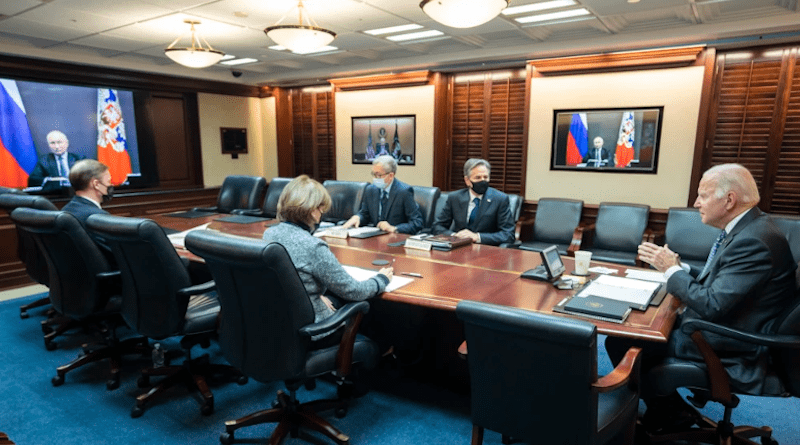Biden’s ‘Gaffe’ About Removing Putin Should Spur Focus On Russia’s Allies – OpEd
Amid the debate surrounding whether or not it was a gaffe when President Joe Biden declared that Russian President Vladimir Putin “cannot remain in power,” a more serious question must be asked: Are American leaders doing everything in their own power to thwart Russia’s invasion of Ukraine?
The answer involves not just Russia, but a staunch ally of Moscow whose geopolitical role in the Ukraine war has flown largely under the radar.
On March 28, Rep. Adam Kinzinger of Illinois tweeted, “There are going to be a few countries that realize now maybe a good time to get your land back from Russia. Fire sale on occupied territories.”
Indeed, Putin’s pattern of aggression long predates the current war — from the occupation of the Georgian territories of Abkhazia and South Ossetia in 2008, to the annexation of Crimea in 2014, to the Donbas war of 2017. At every juncture, the West was relatively subdued in its response to the Kremlin.
That has not been the case in 2022, with the United States and European nations levying unprecedented sanctions against Russia. But Putin has been emboldened to the point where the West’s more forceful response could be coming too late for Ukraine.
Kinzinger’s tweet was referring to a region where Russian influence is significant, yet more subtle — Eurasia’s South Caucasus. Rather than acting as a direct military aggressor, Russia’s latest power play in the Caucasus came in verbal form. Last week, the Russian defense ministry accused Azerbaijan of “violating the provisions of the tripartite statement of the leaders of Russia, Azerbaijan and Armenia of November 9, 2020” by entering “the zone of responsibility of the Russian peacekeeping contingent on the territory of Nagorno-Karabakh and set up an observation post.”
The statement invoked the 2020 war between Armenia and Azerbaijan, which ended with a Russian-brokered ceasefire deal. The agreement stipulated that Armenia fully withdraw from the internationally recognized Azerbaijani territories that it had occupied for three decades. Regarding those territories, the U.S. State Department asserts that it “does not recognize Nagorno-Karabakh as an independent country,” thereby affirming the “territorial integrity of Azerbaijan.”
Responding to Russia’s recent comments, Azerbaijan’s defense ministry noted that illegal Armenian armed detachments had “attempted to sabotage the Azerbaijan Army Units” and called for Armenia to “completely withdraw the remnants of the Armenian army and illegal Armenian armed detachments from the territory of Azerbaijan recognized by the international community.”
It is incumbent upon observers of the situation in the Caucasus to avoid dismissing it as an obscure, far-flung dispute. Rather, they should connect the geopolitical dots from the Caucasus to Ukraine.
That connection was clear last week when Mikhail Delyagin — deputy of the State Duma, the lower house of the Federal Assembly of Russia — published a Twitter poll asking whether Russia should use tactical nuclear weapons against Azerbaijan’s oil industry due to Azerbaijani support for Ukraine.
Armenia is no ordinary ally of Russia. Armenian-Russian military ties are highly intertwined, to the point where Armenia is home to the Russian 102nd Military Base in Gyumri and the Russian 3624th Airbase in Erebuni Airport near Yerevan.
It should come as no surprise, then, that shortly after the invasion of Ukraine, Armenia was the only country (besides Russia itself) to vote against the Council of Europe’s decision to suspend Russia from the 47-member body. Further, Armenian separatists who remain in the territories formerly occupied by their nation are openly supporting Russia, lauding Moscow’s recognition of two breakaway regions in eastern Ukraine (Donetsk and Lugansk) as independent republics.
The broader implications of the Caucasus conflict spill over into the halls of Congress, particularly when it comes to federal lawmakers from California. The leaders of the Congressional Armenian Caucus include California Reps. Jackie Speier (co-chair of the caucus), David Valadao (co-chair), and Adam Schiff (vice-chair).
Today, Armenia’s most vocal supporters in Congress are faced with an uncomfortable predicament. Naturally, they are condemning the Russian invasion of Ukraine. Yet it is all but assured that they will remain silent on Armenia’s stalwart support for Russia, even when those dynamics have implications for Ukraine.
Meanwhile, the State Department has also failed to see the bigger picture in the Caucasus, as it released a statement last week that called Azerbaijani troop movements “irresponsible and unnecessarily provocative” — squarely aligning with Russia’s remarks on the matter. Accordingly, it seems that the Armenia-Azerbaijan conflict is the one issue on which the U.S. and Russia are finding common ground these days.
Will Biden allow Putin to remain in power? Such a question does not need to be a gaffe. Rather, the question should implore political leaders from California and nationwide to delve beneath the surface — namely, by understanding that Russia’s strongest allies must also be considered as key pieces of the puzzle when it comes to Ukraine.
*Jacob Kamaras is the editor and publisher of the San Diego Jewish World, the former editor in chief of the Jewish News Syndicate, and the founder of Stellar Jay Communications, a PR firm representing Azerbaijan.

